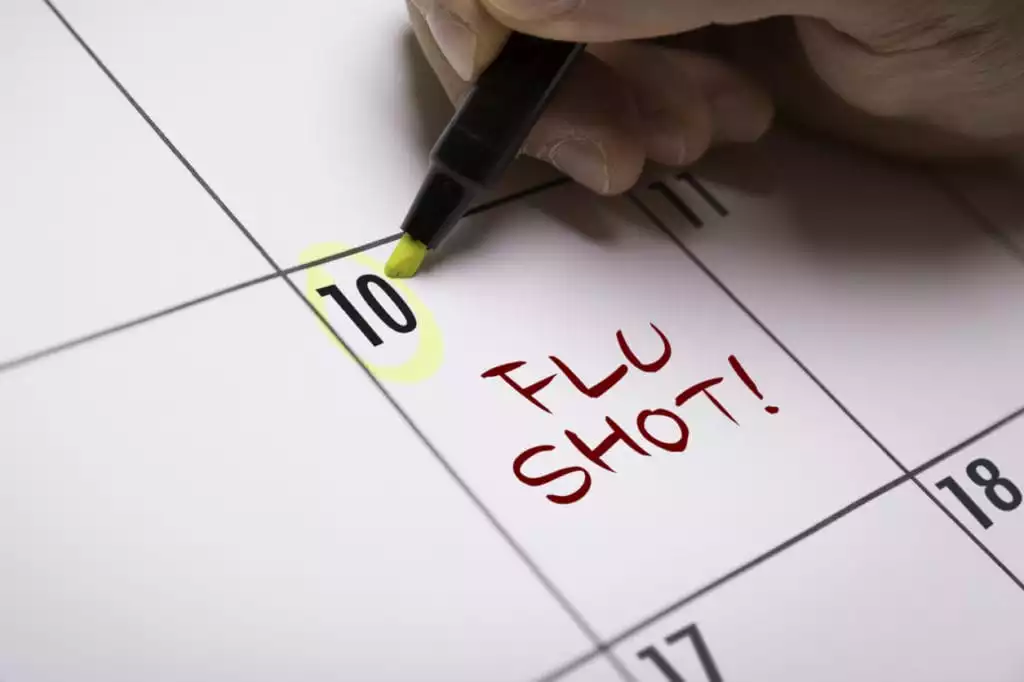
Influenza (“the flu”) is an underestimated disease that really encompasses hundreds of potential influenza viruses producing malaise, fever, and in some cases, extreme sickness.
Sometimes, people confuse the common cold with the flu, but these two illnesses are not the same, and often, do not produce the same symptoms.
While a mild case of flu can have similar symptoms to a cold, it’s potentially much more serious – and the sensible thing to do is minimize your chances of catching it. You can effectively protect yourself against flu by having a simple influenza vaccination right in your local pharmacy. That’s the key message of National Influenza Vaccination Week!
The goal of National Influenza Vaccination Week is to spread awareness of this illness, and explore the options to keep yourself protected from it. Here’s what you should know.
About The Flu
Part of National Influenza Vaccination Week is to learn about the flu. Every year millions of Americans catch the flu. Hundreds of thousands more have to spend time in hospital or even die as a result of it. The CDC estimates that seasonal flu kills up to 49,000 people in the USA every year. Most of the victims are young children, older adults, pregnant women, and people with pre-existing conditions.
Even healthy adults, who can usually fight off a flu infection at the cost of one or two weeks of misery, have an increased risk for dangerous complications. Influenza is a a serious disease, and it’s important to protect yourself against it.
What Causes The Flu?
Influenzas are caused by one or more of three viruses, each of which has a propensity to mutate or change and produce new flus over time. Flu viruses spread most easily when people spend a lot of time indoors – which is why rates increase in winter.
Easier communicability also plays a role in why the flu tends to show up as seasonal outbreaks, which sometime grow into epidemics, rather than a single epidemic that dies out for good.
How to Prevent the Flu
Another part of National Influenza Vaccination Week is understand how to prevent and avoid the flu. The best way to prevent seasonal flu is to visit your pharmacy or doctor and get the vaccine every year.
Each year’s flu vaccine protects for a small handful of the most common flu viruses detected in America. Although no vaccine offers perfect protection, getting vaccinated will lessen your chance of experiencing illness significantly.
Some patients should receive flu vaccines because the risk to their health when contracting the flu is high. This includes:
- Adults aged 50 and older
- Children aged 6 mos. to 4 years
- People with a BMI of 40 or over
- People with Diabetes
- Chronic heart disease sufferers
- Chronic lung disease sufferers
- Women who are pregnant
- Women who are nursing
- Residents of nursing homes
- Patients in chronic care facilities
- Native Americans
- Health professionals
- Caregivers of young children and older adults
Doctors may also recommend that patients receive a flu shot if they suffer from other illnesses or conditions, like autoimmune diseases or neurological conditions.
Even if you’re not in one of these groups, getting an annual flu vaccine is still a very good idea. The risk of complications from the flu is low, but it isn’t zero, and some patients even develop very severe cases of pneumonia as a side effect.
It’s just not worth the risk.
Special Exceptions
Some patients cannot receive a vaccine in any circumstances. These patients include babies under six months old and anyone who has a severe allergy to any ingredient in the vaccine (e.g., gelatin allergies). Patients who live with or spend time around these people should get the vaccine to lessen the chance of passing deadly illnesses on.
If you aren’t sure whether you qualify for an exception, talk to a pharmacist or your doctor for the latest advice. Modern vaccines are usually safe for people with egg allergies. However, you should get medical advice first if your allergy is very severe. Your pharmacist may have you take the injection at the pharmacy. They may also keep you there for monitoring until he or she is sure you won’t have a reaction.
How Long Does Each Vaccine Work?
The virus that causes the flu is constantly mutating in response to our attempts to thwart it. The vaccine that protects you against last year’s flu epidemic probably won’t help against the slightly different virus that’s circulating this year. This also means it isn’t possible to develop a vaccine that you can receive once and be protected for life (at least not yet – science is working on it!).
Although most cases of flu happen between December and February, the virus circulates all year round. The CDC tracks how it’s changing and updates the vaccine to protect against the variants that will probably be most common in the coming winter.
If you get the flu vaccination in October or November, it takes around two weeks for your body to produce the necessary antibodies that protect you from infection. Although the vaccine only targets the most common forms of the flu, if you do catch a slightly different variant, the symptoms will probably be less severe.
Why Have a National Influenza Vaccination Week?
The CDC runs National Influenza Vaccine Week to raise public awareness of the vaccine, its effectiveness and why it’s important to have it. Unfortunately, although the influenza vaccine is safe and effective, not enough people are getting it. Last year, only about 40 percent of American citizens who belong to the most vulnerable groups got vaccines by the end of November. Along with this, very few get the vaccine after that point.
That leaves a lot of people at risk.
Some of this comes from a lack of understanding or confusion around flu vaccine safety. Internet rumors and websites often attempt to convince people that the vaccine is dangerous. However, unless you’re allergic or have very rare illnesses, this simply isn’t supported by science.
That’s why it’s important for people to understand National Influenza Vaccination Week. The pros of receiving a flu vaccine far outweigh the costs.
Not getting the flu vaccine, however, can endanger you and other people. The more Americans are vaccinated against this year’s variety of flu, the harder it is for infection to spread. This is called “herd immunity” and it’s really important for the minority who can’t have the vaccination themselves, especially very young children.
If you get flu, there’s a very high chance that your family will catch it too. Therefore, by avoiding the vaccine, you may also be putting those closest to you in danger.
The goal behind National Influenza Vaccine Week is to encourage people to learn about the flu vaccine and why it’s so important. Ultimately, we want to inspire people to have conversations with their medical care team about the vaccine so they can better understand their options.
Why It’s Never Too Late
Although flu activity starts to decline after February, it remains relatively common well into the spring (even late May). If you haven’t been vaccinated, there is still plenty of time to benefit. A vaccination in December will protect you for months to come. Even if you’ve already had a flu this year, it can keep you safe from being infected again with a slightly different strain of the virus.
With National Influenza Vaccination Week, we can help reduce the spread of this illness. Every time you avoid catching flu you save yourself from an unpleasant illness, missed work and medical expenses – not something anyone wants. Remember: a serious case of flu can be expensive. There’s hospital visits, lost time at work, and the never-ending selection of over-the-counter medicine used to control your symptoms.
Yuck!
Help us to spread the word of National Influenza Vaccination Week to help protect yourself and your loved ones!

 info@burtsrx.com
info@burtsrx.com

